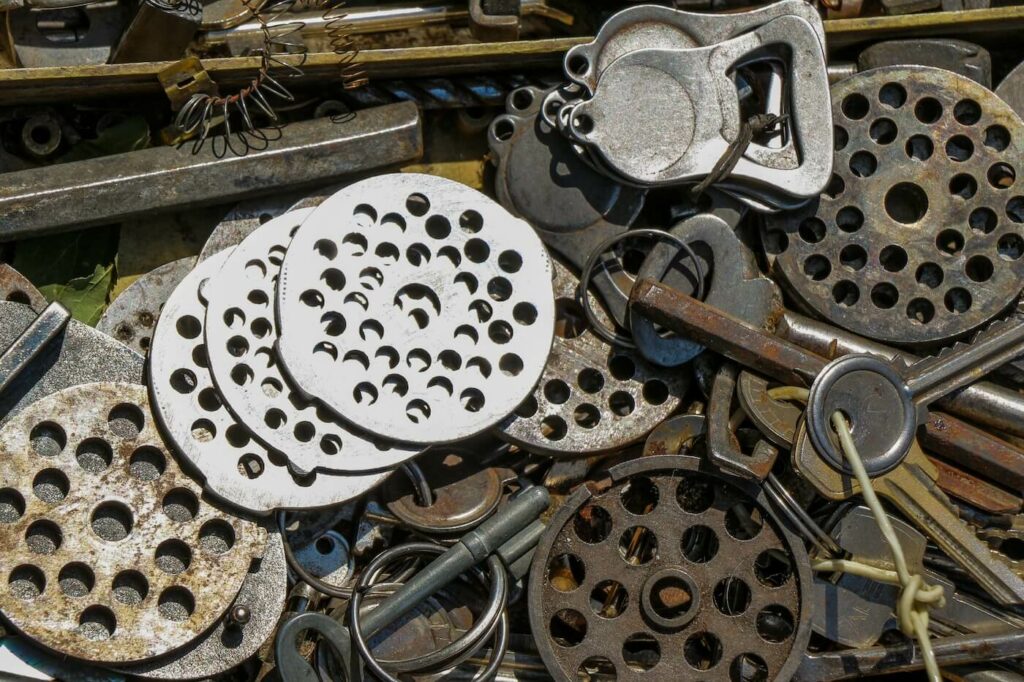How To Dispose of Steel & Scrap Metal

Scrap metal, whether from old cast iron pans, steel bicycles, fences, or excess rebars, is highly valuable and recyclable. Once retrieved from scrap and rubbish, it can be sorted, sheared, and smelted to become useful raw material.
It would be best to recycle steel and scrap metal whenever possible. Not only is it very difficult to acquire and process raw materials, but plenty of recycling centres already accept scrap metal, making it very easy to dispose of.
Instead of leaving your scrap metal at home, collecting dust and building up rust, it's best to send it off for recycling. But before you dive deep into the recycling and disposal process, it’s crucial to distinguish between different types of metal and where each type goes in the recycling stream.
Understanding the Different Types of Scrap Metal
Scrap metal comes in different types, such as stainless steel, brass, nickel, zinc, cast iron, etc. Moreover, using scrap metal such as recycled aluminium to create reusable material uses only 5% of the energy needed to extract the same amount of metal from ores or raw materials.
Despite the sheer number of metal alloys and types of metal, you can divide them into two major categories: Ferrous and Non-ferrous.
Non-ferrous Metals
Non-ferrous metals are metals and metal alloys that don’t contain iron. These include gold, silver, copper, aluminium, zinc, and lead. They are more resistant to corrosion and are easily distinguished since they are not magnetic.
Ferrous Metals
Ferrous metals all contain iron, are magnetic, and easily corrode or rust. Common examples include stainless steel and cast iron. Scrap steel and other types of ferrous metals are 100% recyclable, making them the most recycled metals in Australia and the world.
Now that you know how to identify the type of metal, let’s discuss effective ways to dispose of it! We’ll also provide a guide on how to recycle it efficiently.
1. Determine your scrap metal sources
The first step to disposing of scrap metal is identifying your sources. Metal scraps come from several products and materials: tin cans, beverage cans, structural steel, old hobby equipment, etc.
Some types of scrap metal are more common in some industries than others. For example, convenience stores and retail outlets may generate more aluminium and tin cans, while automotive shops may have more cast iron waste.
2. Collect and Sort
Once you’ve identified which type of metal is common in your household or workplace, it’s time to organise and prepare them for disposal.
Here, we’ll apply what you’ve learned in the above section and organise the scrap metal into ferrous and non-ferrous categories. Non-ferrous metals often cost more than ferrous metals when sold in the scrap market.
It’s also crucial to segregate the types of metals, as recycling facilities won’t process mixed scrap metals.
3. Look for a Local Scrapyard
Selling metal waste to a local scrapyard is the most straightforward option. You can take all your sorted metal to your local yard, and they will provide a cost estimate based on the weight and type of metal.
Construction and industrial businesses also greatly benefit from local scrap yards as these niches generate tons of scrap metal, even entire cars and busted equipment.
Scrap yards generate income by selling sorted metals to refineries, so they only buy properly sorted metals.
While refineries would pay more for your scrap metal, they only buy it in bulk. That’s why your local scrap yard is your go-to solution for disposing of metals while earning a few dollars back.
4. Call a Reliable Rubbish Removal team in Sydney
Collecting, sorting, and transporting your scrap metal may take up a lot of time and isn’t ideal for your busy schedule. Call our rubbish removal team at All Gone Rubbish Removals for swift and reliable scrap metal removal.
We have a network of recycling facilities and refineries that process all types of scrap metal. Schedule an appointment at your convenience, and we’ll arrive at your property equipped with tools and gear to remove renovation waste, scrap rebars, and other metal waste on the same day.
Conclusion
Leaving heaps of scrap metal around can pose safety risks for homeowners and workers. However, disposing of steel and scrap metal isn’t a walk in the park. So it’s best to have the right team to do the job for you.
For affordable and reliable same-day steel and scrap metal removal, call Aaron today at 0427 783 277. We take your safety and ours very seriously and have the expertise and equipment to handle residential, commercial, and construction clean-up, regardless of size. For your next rubbish removal, call us. We proudly serve Sydney, Central Coast, Newcastle, and the Hunter Region.
